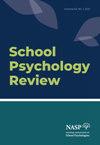Strengthening the School in School Psychology Training and Practice
IF 3
3区 心理学
Q1 Social Sciences
引用次数: 2
Abstract
Abstract What does it mean to be a SCHOOL psychologist? Since the 1980s, multiple school psychology authors have recommended turning from the traditional individual assessment role, emphasizing student deficits, to a focus on enhancing school systems and supporting the adults who work with students. A realignment of training and practice is made more urgent by the societal effect of the Covid Pandemic on schooling and the increasing emphasis on implementing social justice and equity in the schools. The core function of schools in developing the academic competence of students continues to require attention by school psychology, even more so at this time. Given that change has been elusive, it is important to reassess the barriers that have limited change, including underlying values and beliefs that focus on the individual, as well as lack of skills to implement new practices. Although profoundly difficult to achieve at scale, some programmatic changes that would support new practice models are described, along with resources to support change. Impact Statement School psychologists have the opportunity to become more effective school partners to address the challenges that have emerged from the Covid Pandemic and the equity movement. Moving away from the focus on individual deficits to a systems orientation and indirect service delivery requires new beliefs/values and skills. Effectively impacting academic outcomes, a core function of schooling, requires trainers, students, and practitioners to develop and enhance skills related to academic assessment, consultation, teaming, and issues specific to addressing equity (e.g., second language issues, exclusionary discipline).加强学校在学校心理方面的培训与实践
成为一名学校心理学家意味着什么?自20世纪80年代以来,多名学校心理学作者建议从传统的个人评估角色(强调学生的缺陷)转向关注加强学校系统和支持与学生一起工作的成年人。Covid - 19大流行对学校教育的社会影响以及越来越强调在学校实施社会正义和公平,使培训和实践的重新调整变得更加紧迫。学校在培养学生学术能力方面的核心功能仍然需要学校心理学的关注,在这个时候更是如此。考虑到变化是难以捉摸的,重新评估限制变化的障碍是很重要的,包括关注个人的潜在价值观和信念,以及缺乏实施新实践的技能。尽管在规模上很难实现,但是描述了一些支持新实践模型的程序性变更,以及支持变更的资源。学校心理学家有机会成为更有效的学校合作伙伴,以应对新冠疫情和公平运动带来的挑战。从关注个人缺陷转向系统导向和间接服务提供需要新的信念/价值观和技能。有效地影响学术成果是学校教育的核心功能,这需要培训师、学生和从业者发展和提高与学术评估、咨询、团队合作和解决公平问题(如第二语言问题、排他性学科)相关的技能。
本文章由计算机程序翻译,如有差异,请以英文原文为准。
求助全文
约1分钟内获得全文
求助全文
来源期刊

School Psychology Review
Social Sciences-Education
CiteScore
6.90
自引率
20.00%
发文量
54
期刊介绍:
School Psychology Review (SPR) is a refereed journal published quarterly by NASP. Its primary purpose is to provide a means for communicating scholarly advances in research, training, and practice related to psychology and education, and specifically to school psychology. Of particular interest are articles presenting original, data-based research that can contribute to the development of innovative intervention and prevention strategies and the evaluation of these approaches. SPR presents important conceptual developments and empirical findings from a wide range of disciplines (e.g., educational, child clinical, pediatric, community.
 求助内容:
求助内容: 应助结果提醒方式:
应助结果提醒方式:


